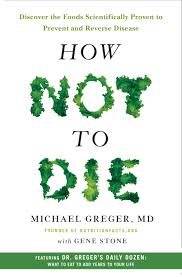Diet action plan from "How not to die" book
Checklist for Good Health 3 servings of Beans 1 serving of Berries 3 servings of other fruits 1 serving of Cruciferous vegetables 2 servings of Greens 2 servings of Other Vegetables 1 serving of Flaxseed 1 serving of Nuts 1 serving of Spices 3 servings of Whole Grains 5 servings of Beverages 1 tablet of Vitamin B12 supplement 1 workout session
